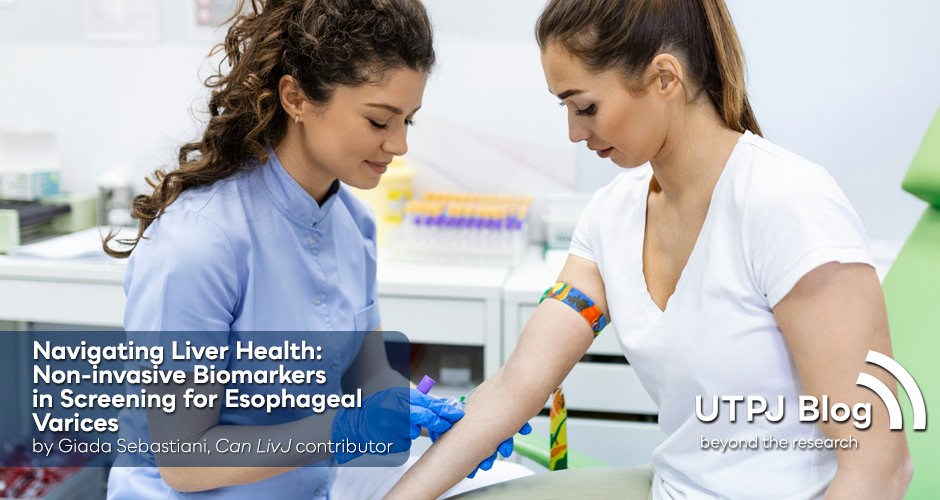
Written by guest blogger Giada Sebastiani.
Introduction:
In the realm of liver health, our recent study has uncovered insights into the screening of esophageal varices (EV) in people living with hepatitis B (HBV), hepatitis C (HCV), or the human immunodeficiency virus (HIV). The study’s findings underscore the benefits for both medical practitioners and the broader public.
Our research focused on compensated advanced chronic liver disease (cACLD) and its correlation with EV, a serious condition that demands careful screening and management. We were pleased to uncover the effectiveness of non-invasive criteria, specifically those based on liver stiffness measurement (LSM) and simple blood tests, in identifying patients with virus-related cACLD at low risk of EV needing treatment (EVNT). Our study included 353 patients, encompassing a diverse group living with HIV, HBV, or HCV. Of note, while these non-invasive tests are well validated in people with HCV, less was known about their diagnostic performance in people with HIV and HBV.
Key Findings:
Both Baveno VI and expanded Baveno VI criteria, incorporating LSM and platelets, exhibited remarkable accuracy in sparing unnecessary esophagogastroduodenoscopies (EGD) while minimizing the risk of missing EVNT. Our study revealed that these criteria spared 26.1% and 51.6% of EGD, respectively, while missing less than 2% of EVNT cases. Additionally, simple fibrosis biomarkers such as Fibrosis-4 Index (FIB-4), AST-to-Platelets Ratio Index (APRI), and AST-to-ALT ratio proved effective in resource-strained settings. For instance, FIB-4 (<2.78) spared 48.2% of EGD, APRI (<1.1) spared 58%, and AST-to-ALT ratio (<0.75) spared 24.3%, all while missing less than 3% of EVNT.
Implications for the Public:
What the public should grasp from this research is the potential to improve liver health screenings in people living with virus-related cACLD, especially in low-resource settings. The findings suggest that non-invasive criteria centred on LSM and simple biomarkers can significantly reduce the need for invasive procedures like EGD. This not only saves valuable medical resources but also minimizes the burden on patients and the health care system.
For individuals outside the medical field, the study underscores the importance of routine liver health check-ups, especially for those living with HBV, HCV, or HIV. By understanding the non-invasive screening criteria highlighted in our research, individuals can advocate for their own health and work collaboratively with health care professionals to ensure appropriate screenings are conducted.
Conclusion:
In conclusion, our research on non-invasive criteria for EV screening in virus-related cACLD is a promising step toward more efficient and patient-friendly liver health management. The study’s findings highlight the potential to spare unnecessary EGD, optimize resource utilization, and enhance the overall well-being of individuals living with HBV, HCV, or HIV. As we move forward in liver health care, we should pursue the systematic integration of these non-invasive criteria into routine clinical practice.
GIADA SEBASTIANI  is Professor of Medicine in the Division of Gastroenterology of Hepatology at McGill University. She received a medical degree and specialized in internal medicine at the University of Padua, Italy. She had research training at Harvard Medical School (US), University College of London (UK), University of Bordeaux (France).
is Professor of Medicine in the Division of Gastroenterology of Hepatology at McGill University. She received a medical degree and specialized in internal medicine at the University of Padua, Italy. She had research training at Harvard Medical School (US), University College of London (UK), University of Bordeaux (France).
Her work focuses on steatotic liver disease (MASLD), liver fibrosis and non-invasive diagnostic tools in liver disease. She is author of 165 articles in peer-reviewed journals (including Nature Reviews Gastroenterology & Hepatology, Lancet Gastroenterology and Hepatology, Lancet Digital Health, Gastroenterology, Hepatology, Journal of Hepatology, Clinical Infectious Diseases), 13 book chapters, 275 conference publications.
Dr. Sebastiani is founding and steering committee member of the Canadian NASH Network and panel member in the Consensus on Models of Care in MASLD of the International Liver Foundation. She is the sole North American representative in the guidelines of the European AIDS Clinical Society as panel member of the Liver Group. Dr. Sebastiani was awarded the prestigious Senior Clinical Research Salary Award from Fonds Recherche Sante Quebec. Her research program is funded by the Canadian Institute for Health Research, the Fonds Recherche Sante Quebec, the CIHR Canadian HIV Trials Network, Crohn’s Colitis Canada.
“Diagnosis of esophageal varices by liver stiffness and serum biomarkers in virus-related compensated advanced chronic liver disease” was published in the Canadian Liver Journal 6.3.
Comments on this entry are closed.